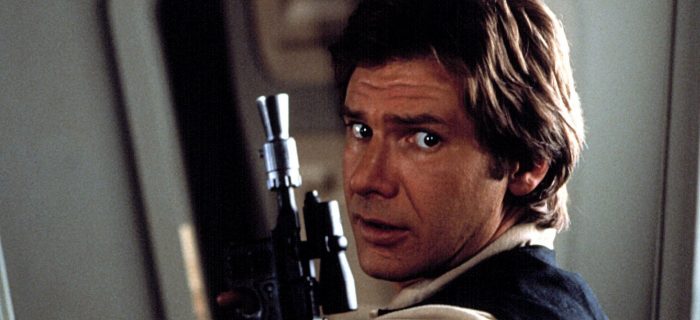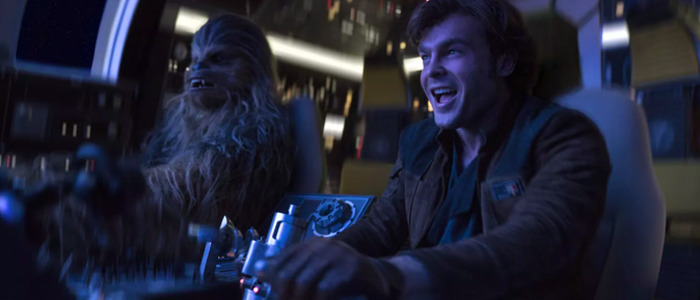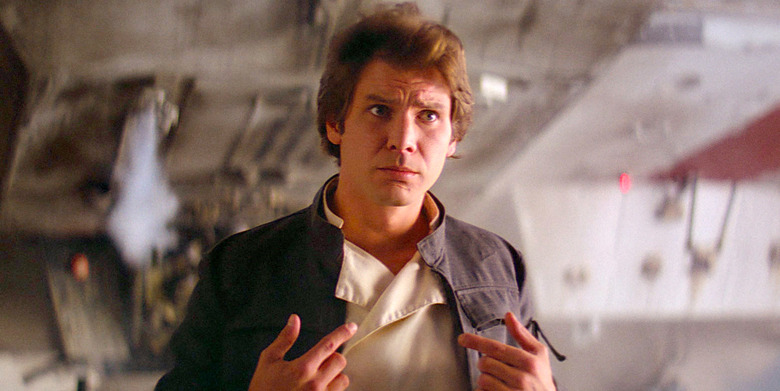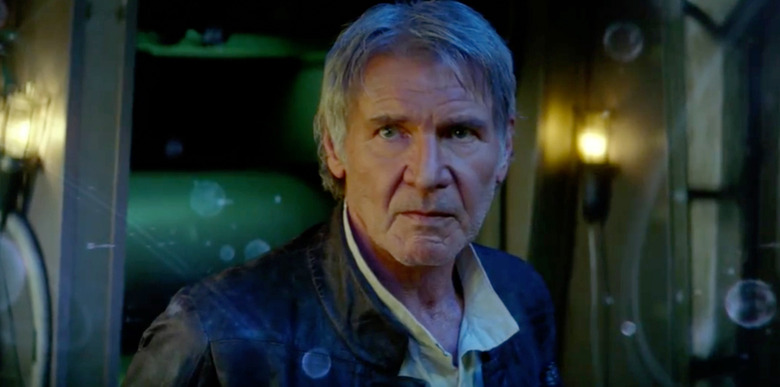Harrison Ford Didn't Care About 'Star Wars' – And That's Why His Han Solo Was So Magical
Han Solo is the best human character in the Star Wars cinematic franchise, as played by someone who didn't seem to care much about the vagaries of the series.
This is the inherent paradox of the character brought to life by Harrison Ford, in a genuinely star-making performance. Before Star Wars, Ford had appeared in a few films, including The Conversation and American Graffiti. However, Han Solo was his breakout role and was at his best in the first film, even if Ford couldn't have cared less about the science-fiction trappings of the world he was occupying.
This week heralds not only the 35th anniversary of the last original-trilogy film in the series, Return of the Jedi, but the return of Han Solo to the big screen in Solo: A Star Wars Story; each of these films, in their own way, proved that lightning could never strike twice.
A New Solo
Solo: A Star Wars Story is a decent enough action-adventure, as long as you completely forget that Alden Ehrenreich is playing a young version of Harrison Ford's iconic Millennium Falcon pilot. It's not so much that Ehrenreich is bad in the film — the oft-repeated story last year that Lucasfilm brought in an acting coach for him says less about his talent, and more that replicating Ford's work is nearly impossible. Anyone who saw Ehrenreich in Hail, Caesar! knows that he's a talented actor with solid comic timing, but duplicating Harrison Ford's work...well, would that it were so simple. It's one thing that Ehrenreich isn't as tall as Ford; that would be a reasonable hurdle to overcome. But too often, this new young Han Solo seems upbeat. Enthusiastic. Excited.
Watching Harrison Ford in the original Star Wars trilogy does not bring to mind the adjectives "upbeat," "enthusiastic," or "excited." One of the most amazing magic tricks ever pulled off in a movie is that a fairly unamused, uninterested actor was able to turn that visible disinterest into a great movie character. From the interviews he's given over the years, it's safe to suggest that Harrison Ford could not have cared less about the inner workings of the Star Wars franchise if he tried. At least in the first film in the franchise, his dismissive attitude feels completely in line with the cocksure and arrogant Han Solo. It's not that Alden Ehrenreich fails at displaying such a seen-it-all attitude in Solo; it's that the character as written seems weirdly divorced from the Han Solo we've known for so long.
Any prequel can try to recontextualize characters or events that the audience is familiar with, but there's typically a sense that when that story ends, it will lead directly to the story we already know. That's not the case with Solo; the end of the new film hints at (of course) a possible sequel, but even that sequel doesn't seem like it would be covering too much unfamiliar or new ground. Most of what we know about Han Solo when he's introduced in the Mos Eisley cantina in the 1977 film is established at the end of Solo. (Spoilers incoming for the ret of this paragraph.) He's won the Millennium Falcon from a not-too-thrilled Lando Calrissian (Donald Glover, whose impersonation of Billy Dee Williams is the best part of the film), he's best friends with Chewbacca, and he's no longer involved with his old girlfriend Qi'Ra (Emilia Clarke), thus making him single again. What's more, the story ends with him and Chewie heading off to Tattooine to meet up with a well-known, fearsome gangster in the hopes of finding work.
Largely speaking, aside from maybe finding out why Greedo doesn't like Han that much and watching Han interact with a slightly younger Jabba the Hutt, the Han we know at the end of Solo ought to be the Han we meet in Star Wars. Are you curious to find out what the Kessel Run was all about? This movie answers your question. How about those infamous dice that Han was holding onto in the original films, all the way into The Force Awakens and The Last Jedi? Covered. And what's the deal with Han's last name? (The answer to this question results in the worst scene in any of the new Star Wars films.) It's hard to imagine Harrison Ford's performance breaking out quite so much if it had been more bogged down in character details like this.
Think of this moment from NBC's Late Night with Conan O'Brien, in which one of Conan's staffers asks Ford a question about the Millennium Falcon. Ford's response may have been part of a scripted bit, but it's awfully easy to imagine that's his real, genuine answer after spending too much time with Han Solo in his head.
How Disinterest Curdled into Disillusionment
Ford's disillusionment with Han Solo was perhaps at its peak when Return of the Jedi came out. He'd spent a long time trying to convince George Lucas that Han shouldn't come back from being frozen in carbonite. As has been discussed in official behind-the-scenes documentaries, Ford (who wasn't originally signed to the third film, and whose star rose even higher after Raiders of the Lost Ark) thought it was most appropriate for Han to die in a self-sacrificial moment. Though one of the film's writers, Lawrence Kasdan (who ended up co-writing Solo with his son Jon), initially agreed, Lucas refused.
So, in some ways, Return of the Jedi feels like a flip side of how Ford appears in the original Star Wars: in both films, he seems fully uninterested in the character, but his discomfort is much more visible when interacting with Ewoks. In the latter case, that disinterest translated into...well, disinterest. The fact that Harrison Ford doesn't care about the first Star Wars is weirdly endearing. The fact that he's clearly not into the twists and turns of Return of the Jedi only speaks to the sense that it's a slight step down from the other two films in the series. The Empire Strikes Back humanizes Han through his star-crossed romance with Leia, whereas Return of the Jedi just turns Han into a caricature of himself.

Of course, Ford eventually got what he wanted with The Force Awakens. Considering how carefully J.J. Abrams protects the movies he makes and the secrets within, it's hard for any fan to have known for sure what would happen to Han Solo in the revival of the franchise. However, seeing Ford as one of the major faces of the film's marketing campaign makes a lot more sense in retrospect. Why would someone who had been so vocal about wanting his character killed off pound the pavement and do tons of interviews in a new movie featuring that character? Well, maybe if that character is finally getting killed, that actor would be willing to go for one last go-round of marketing. So it was with Han, who's offed when his conflicted, villainous son Kylo Ren (Adam Driver) cuts through him with a lightsaber in a moment of high emotion.
Ford, to his credit, seems more invested in portraying Han in The Force Awakens than he did in Return of the Jedi. (Again, it probably helped that he knew it was his last turn as the character.) But even more than in the original trilogy, Ford is tasked with doing his best in selling Han's eventual belief in the mysticism of the Force, which he seems so derisive of in the 1977 original. If anything, that derision humanizes Han and lends a necessary sense of undercutting something overly pompous or fantastical. The Force Awakens tasks Ford with being almost a grumpy mentor; it's funny when Han says, "That's not how the Force works!" to John Boyega's character Finn at one point when the ex-Stormtrooper treats it like a magical cure-all. But it's also a bit odd to hear Han talk about the Jedi and the Force at all. (One of the interesting subtextual elements of the new Star Wars films is that when we meet Luke Skywalker as an old man, he's much more like his old friend Han in terms of embracing the Jedi philosophy.)
An Impossible Task
Part of what makes Han Solo so special in the first Star Wars film is what makes Indiana Jones feel so special in Raiders of the Lost Ark — it's the first time you get to meet a character without being bogged down in explanations. Solo: A Star Wars Story doesn't go too far in over-explaining Han, to the point that we don't meet his parents or learn much about them. But it further waters down a character who was at his best before there was merchandise, before there was a franchise, and before there was an expanded universe. There is something truly singular about Harrison Ford's performance in the first film, an ineffable sense that he's above this nonsense without feeling too snarky about it.
Watching Solo, the reality is clear: casting a young Han Solo was a fruitless effort, just as having an acting coach on the set to aid Ehrenreich in his work was pointless. The only actor who could play Han Solo as a young man is an old man now. As others have written about, even if you cast someone who looks kind of like Harrison Ford — nothing against Ehrenreich's physical attributes (as you can see from my author photo, I'm one to talk), but he looks very little like Harrison Ford did, feathered hair aside — they're probably going to be pretty psyched to play Han Solo in a goddamn Star Wars movie. The weight of expectations and anticipation is too much for any actor to bear.
Maybe the biggest problem of all is one that Harrison Ford didn't have to deal with in the original trilogy, which was primarily more focused on how Han, Luke, Leia and the rest of the Rebel Alliance could ensure a future for the galaxy, than it was on the past of a character like Han. (What little we know about his shady dealings with Jabba the Hutt is more than enough, without getting into the details. And the brief conversation between Han and Jabba inserted into the Special Edition of the 1977 original is, like many of those additions, wildly unnecessary.) Harrison Ford never had to worry too much about the burden of playing Han Solo as anything other than the personification of flippant and too hip for the room, even if Han's not quite as cool as he'd like to be.
Return of the Jedi dilutes Han's hipness — how cool can you look next to Ewoks? — and Solo demystifies the character so much that it recalls Patton Oswalt's famous stand-up routine about the prequels, which climaxes in him shouting, "I don't give a shit where the stuff I love comes from, I just love the stuff I love!" Solo tries to answer questions that didn't need to be resolved, giving Han more of a personal history that only serves to make him feel a lot unlike Han Solo. Harrison Ford knew it better than anyone else: the less we know about Han Solo, the more interesting he is. Solo isn't able to reverse that trend; it just comes closer to ruining what made Ford's performance in the first Star Wars so special.



